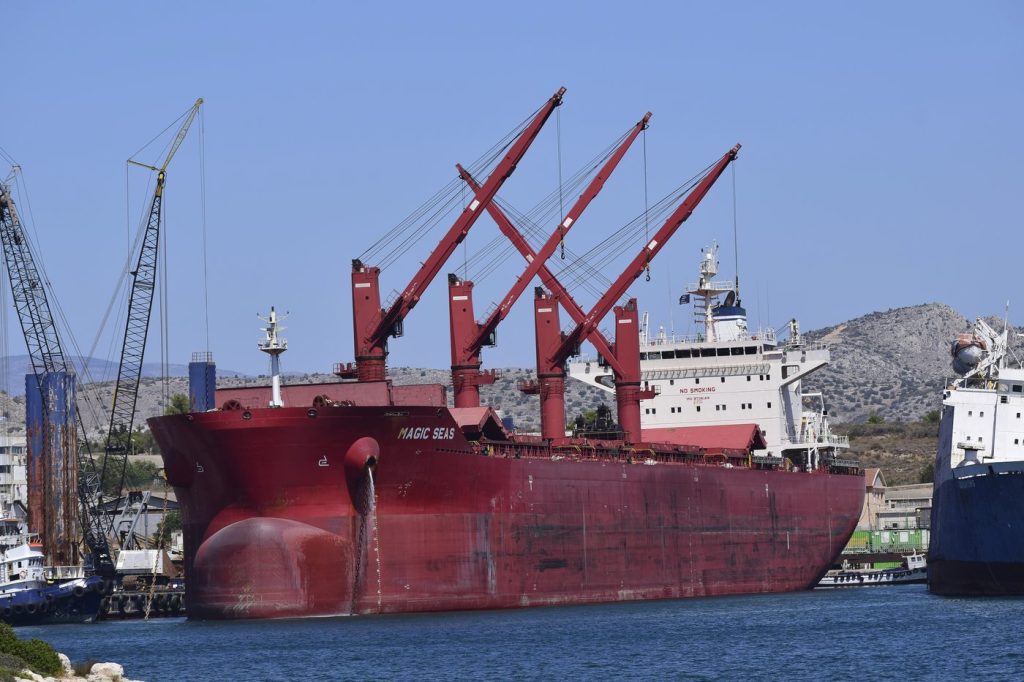DUBAI, United Arab Emirates (AP) - Israel's military conducted airstrikes on ports and facilities controlled by Yemen's Houthi rebels early Monday. In retaliation, the Houthis fired missiles targeting Israel, escalating tensions in the region.
The tensions escalated following a Sunday attack on a Liberian-flagged bulk carrier, the Magic Seas, in the Red Sea, which resulted in the vessel catching fire and its crew abandoning ship. The attack is believed to have been executed by the Houthis, particularly after security reports indicated bomb-carrying drone boats were used against the ship, which was initially targeted by small arms fire and rocket-propelled grenades.
A renewed campaign by the Houthis against shipping in the Red Sea could result in increased involvement from U.S. and Western military forces. President Donald Trump previously authorized significant airstrikes against the Houthis, heightening the risks of wider military engagement in the region, especially during a time when a potential ceasefire between Israel and Hamas is uncertain and negotiations over Iran's nuclear program remain in limbo.
The Israeli military confirmed the strikes on Houthi-held ports in Hodeida, Ras Isa, and Salif, along with the Ras Kanatib power plant. They publicly released video footage of an F-16 fighter jet launching the strikes after issuing a warning for the area. The Israeli military accused the Houthis of using these ports to facilitate the transfer of weapons from Iran, which are utilized against Israel and its allies.
Additionally, Israeli forces targeted the Galaxy Leader, a vessel captured by the Houthis in November 2023. The Israeli military claimed that the Houthis had installed a radar system on the ship for tracking vessels, thereby facilitating further military operations. Although the Houthis acknowledged the strikes, they did not provide an assessment of the damage but claimed to have effectively engaged the Israeli forces.
Israeli Defense Minister Israel Katz warned of further strikes, asserting that any act against Israel would be met with decisive consequences. The Houthis subsequently launched an apparent missile attack against Israel, with the Israeli military attempting to intercept the incoming missiles. Although no injuries were reported, air raid sirens sounded in the West Bank and along the Dead Sea.
The earlier attack on the Magic Seas occurred approximately 100 kilometers southwest of Hodeida as the vessel was headed to Egypt's Suez Canal. It was reported that an armed security team onboard initially returned fire. However, subsequent drone attacks led to the crew having to abandon the ship, which was reportedly taking on water. A passing ship rescued the crew, as the vessel succumbed to the assault.
The U.S. Navy's 5th Fleet acknowledged awareness of the incident but did not provide further details. Yemen's exiled information minister Moammar al-Eryani identified the attacked vessel as the Magic Seas and attributed the assault to the Houthis. He claimed that the incident highlighted the Houthis as a proxy for Iranian aggression aimed at destabilizing the region.
The Houthis have conducted several missile and drone attacks against ships in the Red Sea, which they claim are retaliatory measures against Israel's ongoing offensive against Hamas in Gaza. The group has previously targeted over 100 merchant vessels in the region since late 2023, significantly disrupting trade routes that are valued at approximately $1 trillion annually. Although the Houthis paused their attacks for a period, they have since resumed targeting Israel.
This latest round of violence demonstrates the escalating risks associated with the ongoing geopolitical tensions in the Middle East, particularly regarding Iran's support of militant groups and the broader implications for international shipping and security in the region.












